 In the Shadow of the Ship by Aliette de Bodard
In the Shadow of the Ship by Aliette de Bodard Format: eARC
Source: supplied by publisher via NetGalley
Formats available: hardcover, ebook
Genres: alternate history, science fiction
Series: Universe of Xuya
Pages: 96
Published by Subterranean Press on September 30, 2024
Purchasing Info: Author's Website, Publisher's Website, Amazon, Barnes & Noble, Kobo, Bookshop.org, Better World Books
Goodreads
Nightjar, sentient ship and family matriarch, looms large in Khuyên’s past. Disappearances drove teenage Khuyên from it, but death will steer her back.
Now an adult and a magistrate, Khuyên came for her maternal grandmother’s funeral but finds herself unwittingly reliving her past on the decaying Nightjar. Children are still disappearing as her childhood friends once did; and worse, her beloved Cousin Anh vanishes after pleading for her help.
Khuyên sets out to save Anh alongside Thảo, a beautiful and mysterious woman who seems to know more than she should about Khuyên and the ship. But saving Anh requires doing what Khuyên couldn’t do before: face her family, face the ship, face her own hopes and fears for the future—a future that might well include Thảo, but only if Khuyên can stop listening to the critical voice in her head.
A voice that sounds an awful lot like Nightjar’s...
My Review:
The Universe of Xuya isn’t so much a series as it is a sprawl of alternate history that extends from the early 15th century – the point where the butterfly flapped its wings differently from the history we know – all the way out to an undetermined point VERY far in the future.
It’s a vast, sprawling canvas of a universe that hinges on a single year in history (1411) where two events turned left instead of right. An internal political struggle at the Imperial court of Ming-dynasty China sent the Empire looking outward instead of in (as it did in our history) and a fleet of Imperial ships that planned to head east along the coast was struck by typhoons and found itself drifting north, across the Bering Strait to Alaska, resulting in an earlier “discovery” of North America, from Asia instead of from Europe.
And with those two almighty flaps of the butterfly’s wings, history goes down the other leg of the trousers of time (to thoroughly mix my metaphors) and results in the universe of this series, where China and eventually an independent Việt empire become the dominant influences in the world instead of the West – not that, by the time of this particular entry in the sprawl, the West hasn’t established its own hegemonies in the greater galaxy.
The past is another country, they do things differently there. And if they did things differently than what we know, the future would be an even more different country that it will be on history’s current trajectory.
But the thing about the Xuya Universe is that even though the author has a broad outline of what brought it about and some stories set in the historical past that illustrate some of the points, most of it is set in the future. The galaxy is big, the history and future history is potentially very long indeed, and there’s plenty of scope for pretty much anything to happen pretty much anywhere.
Which leads back to the Universe of Xuya being more of a sprawl than the way we usually think of ‘series’. Each story set in the Xuya Universe is intended to be standalone, and while it might link thematically with other stories, that doesn’t mean it will feature any of the same characters as previous or future entries. There’s obviously a publication order for the series, but the internal chronology is ever changing, and considerably more fluid than is usually the case.
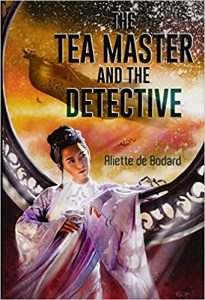 I fell into this series, somewhere in the middle, with The Tea Master and the Detective, because it’s a Sherlock Holmes pastiche and that was an entry point that worked for me – as it usually does. (Also, Tea Master is one of the longer works in the series so it has time and space to get a new reader stuck into the world that’s already been built.) I’ve read around Xuya, but not thoroughly – at least not yet – ever since. Although I’ve just had the light dawn that several of the short stories that were in various SFF magazines are also available as podcasts and that’s an avenue to be explored.
I fell into this series, somewhere in the middle, with The Tea Master and the Detective, because it’s a Sherlock Holmes pastiche and that was an entry point that worked for me – as it usually does. (Also, Tea Master is one of the longer works in the series so it has time and space to get a new reader stuck into the world that’s already been built.) I’ve read around Xuya, but not thoroughly – at least not yet – ever since. Although I’ve just had the light dawn that several of the short stories that were in various SFF magazines are also available as podcasts and that’s an avenue to be explored.
I know I haven’t talked about this particular entry in the series yet, and that’s a bit by design as I have mixed feelings about whether this story is a good place to start. I found it fascinating but I don’t think it’s a good entry point. The author has an excellent precis of the history of Xuya, with a list of stories that give both a loose chronology and some suggestions of stories that might make good places to start on her website – so if you’re looking for an entry point or have visited Xuya and are wondering how it all fits together, take a look.
The story of In the Shadow of the Ship is deceptively small and at first seems simple. It’s the story of a young woman who left a conservative and restrictive home because she didn’t fit in. The life that was mapped out for her, even before her birth, was one she had no interest in or desire to follow. That it seemed like she never had a chance to earn her mother’s love or acceptance made it that much easier to leave the world of her birth behind.
She’s been successful, if lonely, in the intervening years. But when she learns of the death of her grandmother, duty and respect call her home. But home is not a planet, or even a station. Home is a decaying mindship, a refugee from the galactic war that destroyed so much and left so many refugees, ship-bound and planet-dwellers alike. A war that her home, her ship, her family, was on the losing side of.
A home that wants her back – even if her mother still does not.
As an adult, Khuyên has knowingly kept the secret of her family’s status from the empire she serves, even though she knows they are war criminals and that she is guilty by association – and silence. She can’t make herself turn them in, and she can’t bear losing her job and her purpose in the universe she’s made her own.
At the same time, as an adult, when she returns for the funeral, she is able to see that the ship is manipulating her and everyone around her, and that the terrible things she was told to ignore when she was a child are no longer ignorable – or honorable. And that they are wrong.
And that there is no second escape. This time, the only way out is through – no matter the cost.
Escape Rating A-: I enjoyed In the Shadow of the Ship, although it is a very shadowed story indeed and probably needs to be read with the lights on. There’s an underlying creepiness that is totally justified but isn’t revealed until past the halfway point.
Although there’s also a lovely sapphic romance that redeems that darkness – it just takes a while to get there.
That two of the characters of this story were mindships felt like the one, solid link to the Xuya Universe, at least so far as I’ve read into it. A reader who has come at this series from different angles might find more linkages, but it was fine as it was.
The story that it did remind me of, however, was the author’s “The Mausoleum’s Children”, one of this year’s Hugo nominees for Best Short Story. (BTW the award was won by “Better Living Through Algorithms” by Naomi Kritzer, which I read and loved.)
In my review of “The Mausoleum’s Children”, I said that the themes were a bit too big for the package, that it would have worked better in a longer format. Those themes; survivor’s guilt, living with trauma, returning to the place that broke you in the hopes of saving others, and more, received that longer treatment here In the Shadow of the Ship, which made me like both stories just that much better.

 Navigational Entanglements by
Navigational Entanglements by  Escape Rating A-: I grabbed this book because I’ve been picking my way through the author’s vast, sprawling,
Escape Rating A-: I grabbed this book because I’ve been picking my way through the author’s vast, sprawling,  "The Mausoleum's Children" by Aliette de Bodard in Uncanny Magazine Issue 52, May-June 2023 by
"The Mausoleum's Children" by Aliette de Bodard in Uncanny Magazine Issue 52, May-June 2023 by 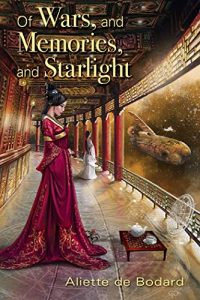 I put this particular story towards the front of the list because of the author. I’ve very much enjoyed her
I put this particular story towards the front of the list because of the author. I’ve very much enjoyed her  The obvious bit is wrapped around Thuận Lộc’s need to belong, her guilt about not bringing her peeps out with her, and her attempt to assuage just a piece of that trauma. But there’s also more than a bit about abuse and its victims, Stockholm Syndrome writ very, very large, and the rapaciousness of greed for power in all forms and the way that some people try to escape evil by getting on top of it or allowing themselves to be co-opted by it.
The obvious bit is wrapped around Thuận Lộc’s need to belong, her guilt about not bringing her peeps out with her, and her attempt to assuage just a piece of that trauma. But there’s also more than a bit about abuse and its victims, Stockholm Syndrome writ very, very large, and the rapaciousness of greed for power in all forms and the way that some people try to escape evil by getting on top of it or allowing themselves to be co-opted by it.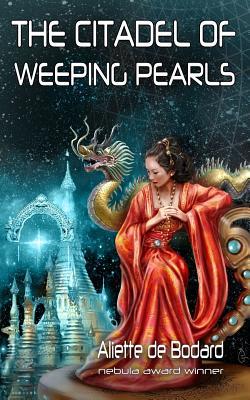 The Citadel of Weeping Pearls (Xuya Universe) by
The Citadel of Weeping Pearls (Xuya Universe) by 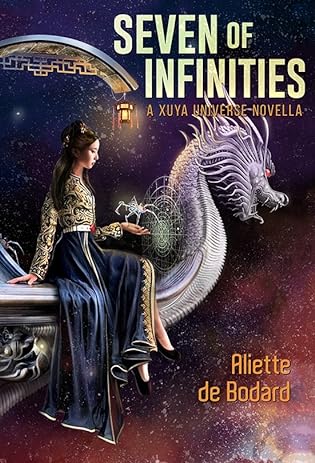 Seven of Infinities by
Seven of Infinities by 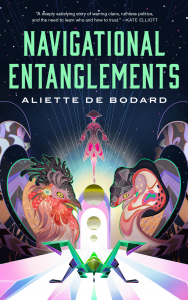 In the
In the 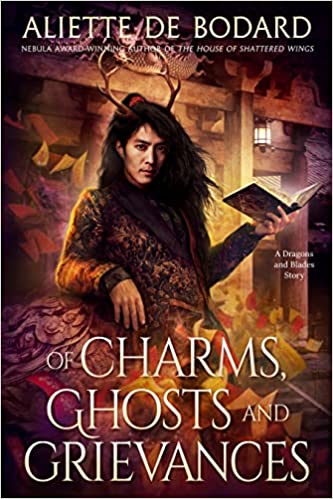 Of Charms, Ghosts and Grievances (Dragons and Blades #2) by
Of Charms, Ghosts and Grievances (Dragons and Blades #2) by  Escape Rating A-: As I said I still haven’t read
Escape Rating A-: As I said I still haven’t read 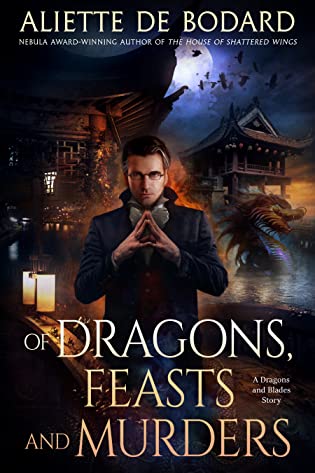 Of Dragons, Feasts and Murders (Dragons and Blades, #1) by
Of Dragons, Feasts and Murders (Dragons and Blades, #1) by 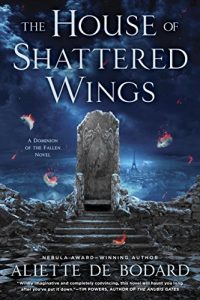 Little did I know that
Little did I know that  So it has the appeal of a mystery in that there’s a dead body and an investigator, while it also has the things that make epic fantasy work so well, just on a smaller scale. There are political shenanigans and court intrigues, everyone is trying to get one over on everyone else – whether they’re part of the murder plot or not – and the throne is under threat by forces unknown who either committed the murder or plan to take advantage of it.
So it has the appeal of a mystery in that there’s a dead body and an investigator, while it also has the things that make epic fantasy work so well, just on a smaller scale. There are political shenanigans and court intrigues, everyone is trying to get one over on everyone else – whether they’re part of the murder plot or not – and the throne is under threat by forces unknown who either committed the murder or plan to take advantage of it.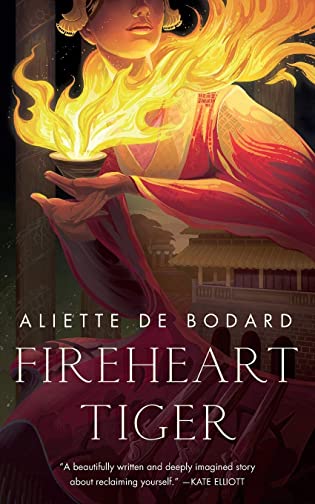 Fireheart Tiger by
Fireheart Tiger by 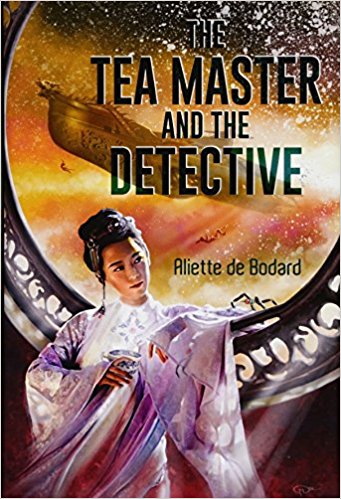 The Tea Master and the Detective (The Universe of Xuya) by
The Tea Master and the Detective (The Universe of Xuya) by